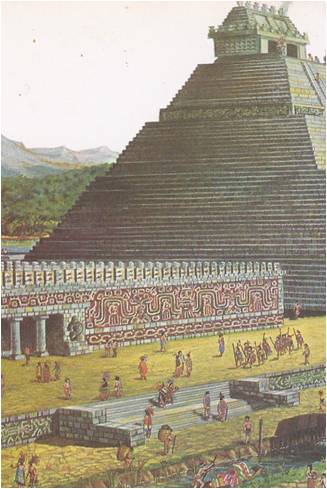Henry Tudor was a patient young man, who waited and watched while civil war raged in England and quarreling lords fought to see who would be king. He waited safely in France, biding his time until his spies told him the hour had come to strike. Then from northern France he crossed the English Channel with 2000 soldiers. Ahead of Henry and his soldiers had gone his agents, who sought to weaken the position of England’s King, Richard III. Henry’s agents had plotted secretly with some of Richard’s supporters, lords who led small armies of their own. That was why …
Read More »Tag Archives: Reformation
Adventures in the New World 1519 – 1620
“I DID NOT come to till the soil like a peasant,” said Hernando Cortez. “I came to find gold.” His words echoed the thoughts of almost every Spaniard in the New World. The discovery of the sea route to the West had set off a great treasure hunt. Colonizing and slaughtering, building and plundering, the gold-hungry Spaniards won a Spanish Empire of the West. Conquistadores‚ they were called — the conquerors. None of the treasure-hunters was more cunning or ambitious than Hernando Cortez‚ who came to the island of Hispaniola in 1504. It was not until 1519 that the governor …
Read More »Defender of the Faith 1521 – 1603
OF ALL THE RULERS OF EUROPE, none was more eager to please the pope, more anxious to prove himself a loyal son of the Church, than Henry VIII, the handsome young monarch of England. Henry was one of the first to offer his soldiers when the pope formed a Holy League to fight the Turks (and to frighten off the French kings, who had developed the unfortunate habit of invading Italy every few years). Henry never actually sent the troops. To show that he meant well, he wrote a strongly worded book about the duties that men owed the pope …
Read More »Preachers of Reform 1518-1564
IN 1518, AN INDULGENCE PEDDLER, a priest from France, made his way through one of the twisting Alpine passes that led into Switzerland. He carried with him a supply of bright banners, an impressive-looking copy of Pope Leo’s Declaration of Indulgences and of course, a collecting box. The French priest’s hopes were high, for the little Swiss merchant towns were rich. He did indeed do well at first and his collecting box began to grow heavy with pieces of gold. Then he came to the town of Zurich. As he began to set up his banners, a town official stopped …
Read More »


